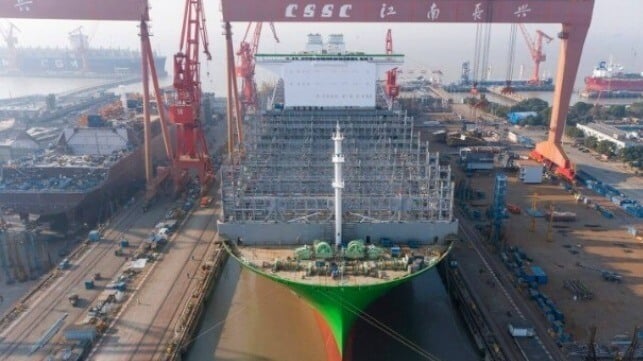U.S. Shipyard Workers Blast White House's Suspension of Chinese Ship Fees

When the Trump administration agreed to suspend its Section 301 fees on Chinese-built ships late last month, America's shipbuilding unions interpreted the deal as a betrayal. U.S. shipyards did not comment on the suspension formally, but their employees were vocal in their displeasure.
The fee suspension has been interpreted as a sign of the trade leverage that Beijing can bring to bear in Washington, thanks in no small part to Chinese dominance over the market for rare earth elements.
Since 2011, Beijing has worked hard to consolidate its rare earths industry into half a dozen large conglomerates - the "Big Six" - which together control about 90 percent of global processing capacity. In October, ahead of trade talks with U.S. President Donald Trump, Beijing announced a new licensing system that would allow it to tightly meter all exports of products containing Chinese rare earths. Virtually all high-tech weaponry requires these ingredients, and metering the rare earth supply would give China considerable control over the production rate of U.S. fighter jets and missiles. (Separately, Chinese commodity buyers stopped importing American soybeans, putting pressure on a politically-influential constituency in rural America.)
After talks between Xi Jinping and Donald Trump in Busan, China agreed to hold off on its rare earth export restrictions; to remove limits on certain computer chip exports; and to resume buying American soybeans at normal volumes. In exchange, the Trump administration gave up its port fees on Chinese ships for one year - relinquishing the cornerstone of its plans for renewing America's shipbuilding industry. The fees were supposed to disincentivize Chinese ship orders and (with accompanying legislation) provide a funding stream for subsidizing American shipyards. After the confirmation of the fee suspension on November 1, international ordering activity at Chinese shipyards jumped back up - and American shipbuilding workers noticed.
"American workers throughout the shipbuilding and maritime supply chains were cautiously optimistic, hopeful that the 'decades of government neglect' identified by the administration as having weakened our nation’s shipbuilding capacity were finally coming to an end," wrote the United Steelworkers, International Brotherhood of Boilermakers and other unions in a joint statement. "Following this retreat, workers who know all too well the boom-and-bust nature of American shipbuilding are again being pushed aside, even as new commercial orders — worth billions of dollars — flow back into Chinese shipyards."
The unions noted that the fee suspension removes any disincentives for buying Chinese ships, and eliminates a potential source of funding for the Maritime Security Trust Fund as outlined in the SHIPS for America Act - contrary to the President’s Executive Order on Restoring Maritime Dominance.

that matters most
Get the latest maritime news delivered to your inbox daily.
While the pause drew the ire of unions, the Section 301 fee suspension has broad support from American importers, exporters, energy firms, and international shipping interests. Among many others, the European Community Shipowners Associations, International Chamber of Shipping, Chamber of Shipping of America, Union of Greek Shipowners, American Petroleum Institute, American Fuel & Petrochemical Manufacturers, National Retail Federation, and the American Soybean Association all wrote in support of the unencumbered use of Chinese ships at American ports.
The Asian Shipowners Association went one step further and expressed its hope that "the agreed suspension evolves into a permanent arrangement" - an outcome that Beijing will press for again next year.
The opinions expressed herein are the author's and not necessarily those of The Maritime Executive.
